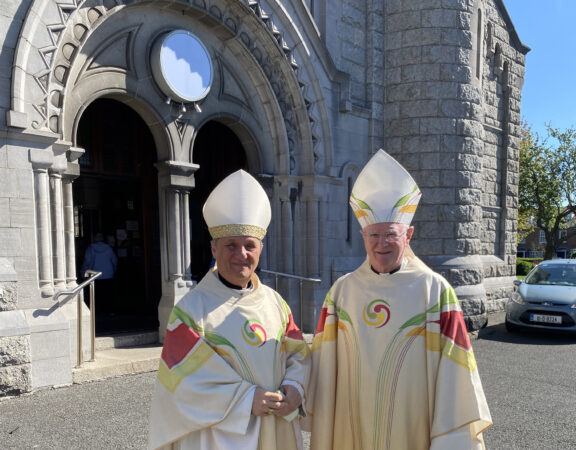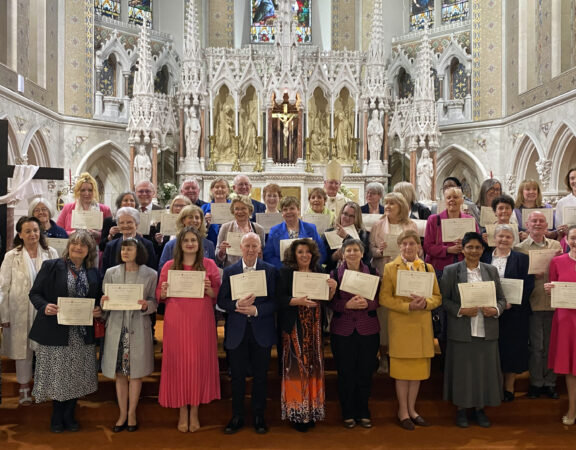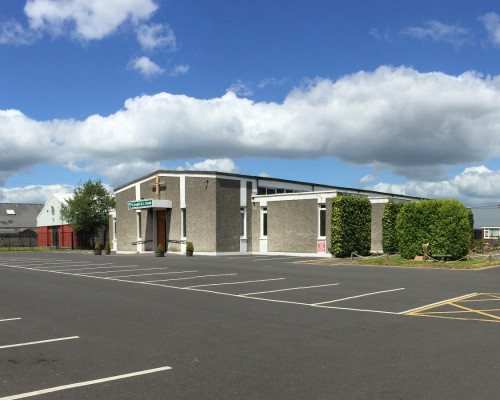ORDINATION OF PERMANENT DEACONS
Homily Notes of
Most Rev. Diarmuid Martin
Archbishop of Dublin
Pro-Cathedral, Dublin, 4th June 2012
This is an historic day in the life of the Church in the Archdiocese of Dublin. This evening we ordain eight men to the order of deacons restoring within our Church the ancient order of permanent deacons, following the indications of the Second Vatican Council.
Many will ask what deacons are. The Vatican Council spoke of a true diaconal ministry in the Church which is exercised in the liturgical and pastoral life of the Church, in charitable works, but which is strengthened by the imposition of hands and the work of the Spirit.
Due perhaps to the fact that for centuries the permanent deaconate and other institutionalised ministries were present in the Latin Church only in a limited manner, there is a tendency in our times to look on ministries in a distorted way, asking in the first place what a person called to a particular ministry can do, as opposed to others. Ordained ministry is classified just in terms of what the deacon or the priest or the bishop can do.
Inevitably in such a context, the restoration of the ministry of permanent deacons is somehow looked on in terms of what the deacon can or cannot do compared with the priest and ministry of the deacon is looked on as some sort of second-class ministry. People who speak or write in this framework fail to understand the deaconate and fail to understand ministry. The order of deacons is not just about doing things; it is a call to be configured in a special way to Jesus who serves and to represent in a special way in the life of the Church Jesus who serves.
We have heard the reading from the Acts of Apostles. It is a reading which is relevant to our ordination this evening but it would be too simplistic to think of that reading directly as the establishment of the order of deacons.
The context of the reading form the Acts of the Apostles was that of a dispute within the Church, as the community of Christians underwent a rapid expansion numerically and entered into different cultures. The predominantly Jewish community in Jerusalem was marked by a sense of intimate gathering to listen to the word of God, for the prayers and for the breaking of bread. Springing from the manner in which they celebrated their communion with Christ in the breaking of bread, the early Christians built up a unique life-style of fellowship and communion with each other.
The Gospel reading which is taken from Saint John’s account of the Last Supper reminds us that the Eucharist is the sacrifice of Jesus self-giving as a servant. As Christians who gather for the Eucharist we are called “to copy what I have done”.
That is the significance of the theme of our 50th International Eucharistic Congress. Communion with Christ is not simply a matter of individual devotion. The theological notion of communion cannot be captured in solely individualistic terms. It flows from that communion which is at the heart of the Trinity and from the way Jesus through revealed to us who God is. Many today fail to see the contribution of our communion with Christ to the good of society. When one feels that communion is just individualistic devotion and that religion is just something for the individual then the sense of Christian fellowship and communion will not be understood.
My dear candidates for deaconate: in your ministry you must remember that the manner in which the value of communion with Christ can be presented in a challenging and convincing way as relevant to the society of our times is through witness. This evening, as deacons, you are being called to be part of that witness, not just through your individual generosity but through the building up of communion in the Church. Communion with Christ must always be clearly marked by a life-style of communion.
The dispute which arose in our reading was about a very practical manner. At the time of the writing of the Acts of the Apostles, the Church was growing and moved from the intimacy of the Jerusalem community to a broader and culturally more mixed and complex community. Change required adaptation: certain parts of that adaptation proceeded normally, but things also went wrong. In our times, the Church in the Archdiocese of Dublin is undergoing great change and a closer look at our reading indicates some interesting and challenging reflections and lessons we can apply to the culture of change that we are experiencing.
The dispute in our reading arose from a complaint from some Greek widows who felt that they were not being treated in the manner in which the deprived of the original Christian communities had been and were not getting their proper share in the distribution of food and support. True fellowship and communion were not being attained.
How did the apostles react? The easy way to interpret their action in designating seven men to assist in the distribution of food is to think in the business terms of our times: it is to say that the twelve decided that this was simply a problem of dysfunctional administration. In that sense the problem could be resolved by introducing new systems: competencies should be more clearly set out, job descriptions better defined and then things would function well. This is the sort of win-win situation we often hear about in business terms. The distribution of food would be more efficient and the apostles would be freed to carry on their ministry of prayer and preaching and presiding.
But this would be a very superficial reading of the text and of the problem to be addressed. What is at stake here is not better administration. It is about the very nature of the Church. When the sense of service and sharing within the Church is obfuscated, then the Church is no longer realising its witness. It is not that systems are not functioning; it is that the very ministry of service which reflects Jesus who serves is weakened in the Church and thus the Church itself is damaged and the message of Jesus concealed.
Ministry in the Church is not about power but about calling and witness. Deacons are called to a special witness of a vital dimension of the life of the Church: the ministry of Jesus who serves. This is of course part of the mission of every Christian, lay and ordained. It is part of the mission of the priest and the bishop, indeed it is a defining part of their mission. But the deaconate is a special witness in the Church reminding the entire community of this dimension of the mission of the Church and calling the entire community to witness.
You are this evening not being ordained for yourselves. Being a deacon is not an honour conferred on you, like an honorary doctorate recognising your service. The ministry being conferred on you is a deep calling to Diaconia, to service, which must now become a fundamental dimension of your personal existence, a dominant characteristic not just pf your ministry but of your lives.
Your configuration to Jesus who serves becomes today part of your identity and is something you must continue to integrate into the way you live from this day onwards. Whenever ministry looses the characteristic of service then it can quickly degenerate into the opposite to ministry, to that “self-indulgence which is the opposite of the spirit”. Your calling is to renounce any temptation towards self-centeredness, towards using ministry and using others really for your own needs. When sacred authority is exercised not as ecclesial service, but in our own interest, then a betrayal of sacred authority takes place.
The decision of the Apostles to resolve the dispute that had arisen was not to treat it as just a problem of administration. Disputes in the Church, then and now, will not be resolved by external structural change alone, but by a return to the very essence of calling. The choice of the seven who in our reading were called to the special ministry of service is not just the fruit of aptitude tests or of canvassing a variety of view points, but in the first place is attained by prayer and the laying on of hands. It is attained through the transmission of special gifts of the Spirit.
It is the Spirit alone who is the guarantee that what is decided in the Church at any time is something which embodies truly what Jesus Christ intends for his Church. Today, at a time of rapid change and of challenge to so much of what is fundamental in life, we have to discern what the Spirit is saying in our time and through the tradition of the Church. We are never free to reinvent the Church at our will. If we attempt on our own to reinvent the Church, then it will remain our Church rather than the Church of Jesus Christ.
My prayer this evening is that in the atmosphere of prayer and silence and worship which we will characterise the Eucharistic Congress we will be led by the Spirit to a path of renewal in the Church, through the authentic witness of all its members and especially now with the special witness to Jesus who serves to which you, our new deacons, are called this evening.









